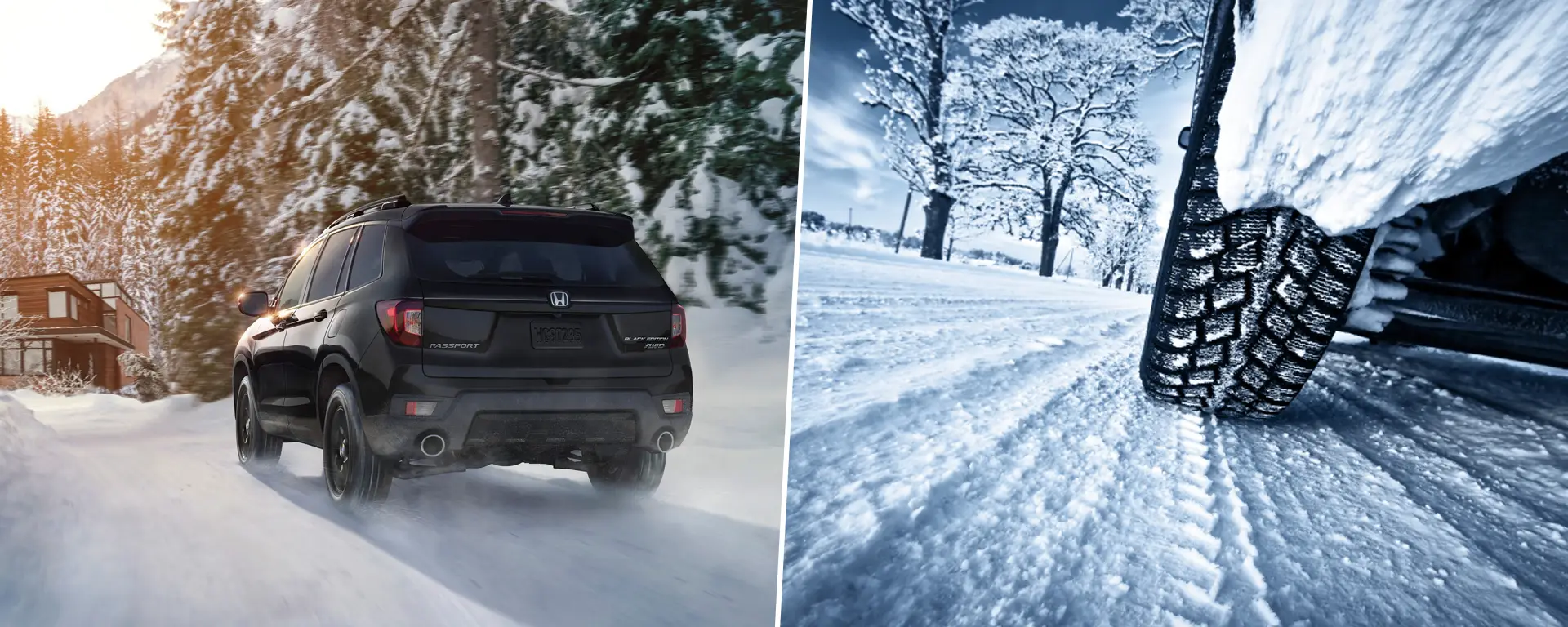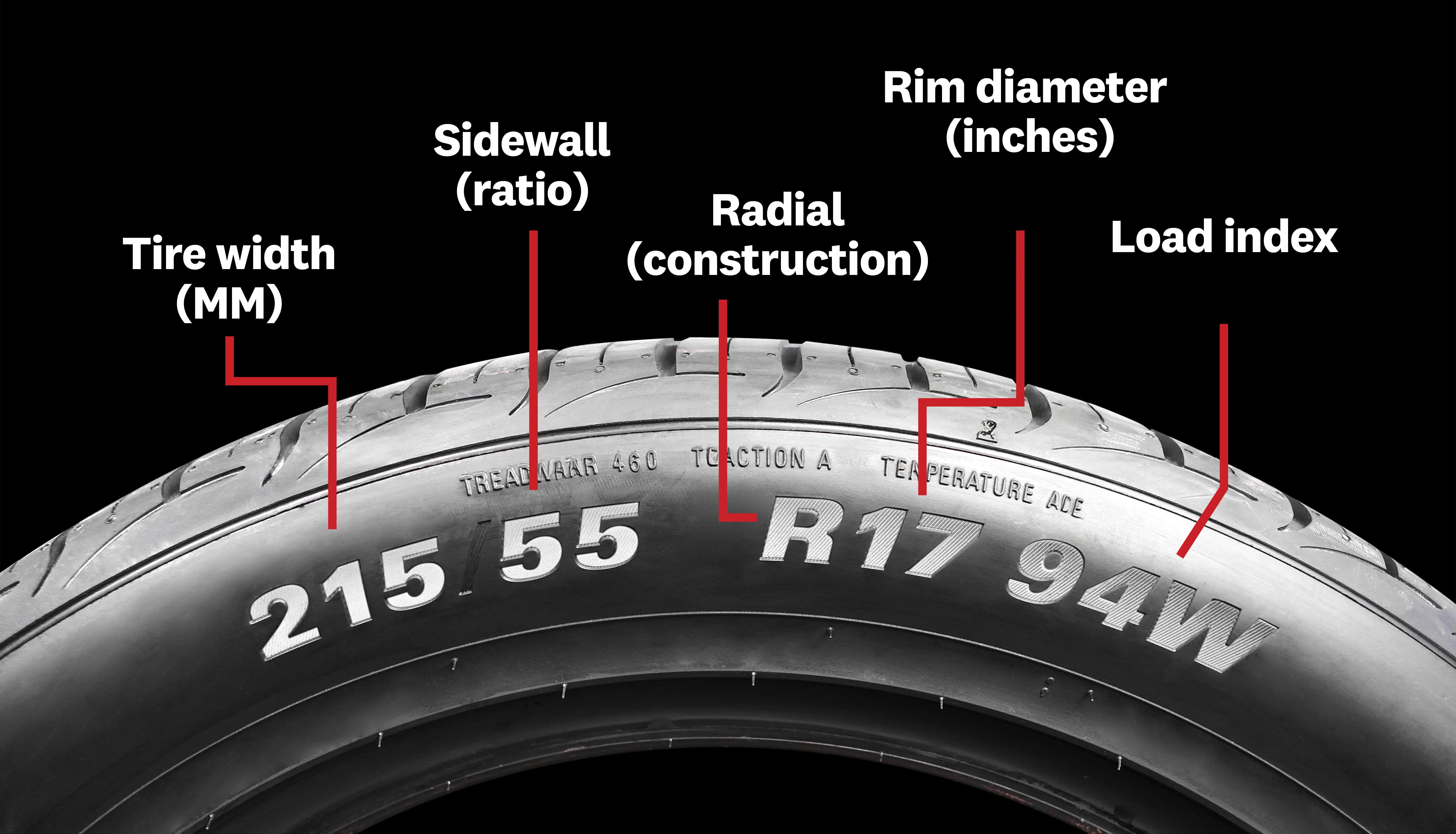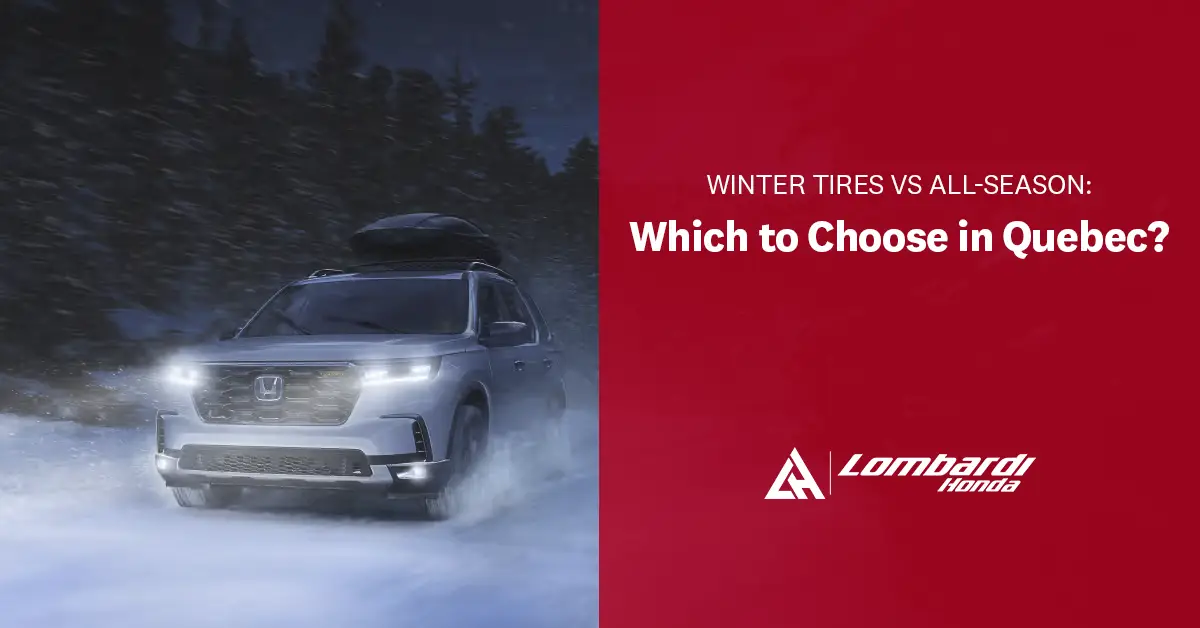In Québec, our roads change with the seasons. Winter covers the asphalt with snow and ice. Spring brings potholes left behind by the frost. Summer heats the highways until they shimmer. And autumn offers vibrant colors, along with cold and damp mornings. In this ever-changing landscape, your tires are not just accessories. They are your first line of safety. So, should you choose winter tires or rather all-season tires certified for Québec winters ❄️? Let’s explore the differences so you can make the right decision based on your driving habits, annual mileage, and even your travel lifestyle.
Winter tires – mandatory and essential
In Québec, the law is clear: from December 1 to March 15, winter tires are mandatory. But beyond legal compliance, they are simply indispensable for safe driving.
Why choose winter tires?
-
Soft rubber that stays flexible even at -30 °C.
-
Deep treads that bite into snow and push away slush.
-
Thin sipes that grip ice.
Picture a January morning, driving your Honda Civic across the Jacques-Cartier Bridge into downtown Montréal. The pavement is icy, the wind harsh. Thanks to your winter tires, your sedan stays stable, and you get to work safely.
According to Transports Québec, a vehicle equipped with winter tires stops on average 25% faster on icy pavement than one with regular all-season tires.
Keeping winter tires on in summer is a common mistake. They wear out quickly in the heat and increase fuel consumption.
At Lombardi Honda, we provide winter tires that match your vehicle and your driving habits. Book your installation today before stock runs out.

All-season tires – convenient, but not all equal
Many drivers wonder if all-season tires can replace winter tires. The answer depends on the type of all-season tire you choose.
Traditional all-season tires (All-Season)
-
Good for spring, summer, and fall.
-
Not safe for Québec winters: their rubber hardens in the cold, losing grip.
-
Not legal in winter: they don’t qualify as winter tires in Québec.
Conclusion: they must be paired with a proper set of winter tires.
All-weather tires (All-Weather ❄️)
This is where confusion often arises. All-weather tires look like regular all-seasons, but they feature the snowflake symbol ❄️ (3PMSF). That means they are:
-
Certified for winter use in Québec.
-
Legal year-round, from January to December.
-
Safer than traditional all-seasons in cold weather.
Take, for example, a Honda Civic driver who lives in Longueuil and works in Montréal. Every day, she drives through the Louis-Hippolyte-La Fontaine Tunnel. With all-weather tires ❄️, she gets enough grip on well-plowed city roads without switching tires twice a year.
That said, in extreme conditions, all-weather tires can’t match the performance of dedicated winter tires.
According to the TCS in Switzerland, in snowy conditions, an all-weather tire may need several more meters to stop compared to a true winter tire. On icy roads, those few meters can make all the difference.
Still unsure whether to choose all-weather or winter tires? At Lombardi Honda, we’ll guide you toward the safest option for YOUR lifestyle.
Winter tires or all-season ❄️?
The right choice depends on your driving habits, your lifestyle… and your annual mileage.
Choose winter tires if:
-
You drive a lot of kilometers every year, especially outside major urban areas (highways, rural regions like Charlevoix or the Laurentians).
-
You often drive early in the morning or late at night, when roads are most icy.
-
You want the best possible performance in harsh winter conditions.
Generally, if you drive more than 20,000 km per year, a two-set solution (summer tires + winter tires) is the safest and most cost-effective choice.
Choose all-weather tires ❄️ if:
-
You drive mainly in urban areas (Montréal, Laval, Longueuil).
-
Your annual mileage is moderate (under 20,000 km).
-
You prefer avoiding seasonal tire changes.
-
You spend the winter in the South (snowbirds) and leave your car parked in Québec. In that case, all-weather tires ❄️ remain legal and practical, even while you’re away.
-
You accept a compromise: slightly less performance than winter tires, but legal and safe year-round.
In short:
-
Winter tires = maximum safety and durability for high-mileage drivers.
-
All-weather tires ❄️ = practicality and savings for moderate mileage or snowbirds.
At Lombardi Honda, we take the time to evaluate your mileage, your routes, and even your travel habits. This way, you leave with the tires that truly fit your life. Make an appointment with our experts.
Tire wear and Quebec roads
Québec roads are particularly tough on tires.
-
Potholes: every spring, the Metropolitan (Highway 40) and Pie-IX turn into obstacle courses.
-
Salt and de-icers: weaken rubber and speed up wear.
-
Temperature swings: from -25°C in January to +30°C in July.
-
Rural roads: coarse and more abrasive, like in Charlevoix.
Tip: check your tires regularly. Even winter tires are nearly useless when too worn.
Stop by Lombardi Honda for a free inspection. It might save you from a roadside breakdown.

Understanding tire markings – easier than it looks
On every tire, you’ll find markings like 205/55R16 91H.
-
205 → tire width (mm).
-
55 → sidewall ratio.
-
R → radial construction.
-
16 → rim diameter (inches).
-
91 → load index.
-
H → speed rating.
At Lombardi Honda, we’ll explain these numbers and make sure you get the perfect fit for your vehicle.
Tips to extend tire life
-
Check tire pressure monthly.
-
Rotate tires every 8,000 km.
-
Monitor tread depth (replace winter tires at 4 mm).
-
Store tires properly, away from heat and sunlight.
Let Lombardi Honda store your tires: no hassle, no clutter, longer tire life.
Common mistakes to avoid
-
Using traditional all-season tires in winter (dangerous and illegal).
-
Mixing different types of tires on the same vehicle.
-
Buying used tires without checking their age (DOT code).
At Lombardi Honda, you leave with guaranteed tires that keep you safe.
Conclusion – The right choice keeps you safe
Every tire has its mission:
-
Winter tires → maximum safety on snow and ice, perfect for high-mileage drivers.
-
All-weather tires ❄️ → practical compromise, legal year-round, ideal for urban drivers, moderate mileage, and snowbirds.
At Lombardi Honda, we’ll guide you toward the right choice based on your routes and your lifestyle.
Don’t let your tires decide for you. Visit us today for advice, an inspection, or a tire change.
A good tire goes unnoticed when everything is fine. But it makes all the difference when things go wrong.
❓ FAQ – Winter tires and all-season in Québec
Are all-season tires good enough for Québec winters?
No. Regular all-seasons are unsafe in winter. Only all-weather tires ❄️, certified for winter, are legal and acceptable year-round.
What’s the difference between all-season and all-weather tires?
All-seasons are versatile but unsafe in winter. All-weathers (with ❄️) are certified for winter, making them legal across Québec.
When should I change my tires?
Switch to winter tires once the temperature consistently drops below 7°C. In spring, wait until it stays above 7°C before reinstalling your summer tires.
